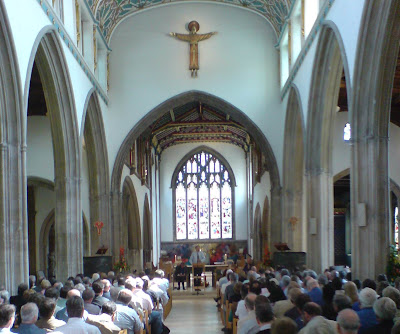
The clergy of the Chelmsford Diocese gathered together today at the Cathedral to hear David Ford give a talk about the Bible. Some notes available if you click ‘full post’.
Ford began by telling an anecdote about a train journey he had recently shared with Prof Nicholas Lash and Prof Eamonn Duffy, when he had asked them what the answer to the title question should be – Lash said ‘a glass of wine’, and Duffy riposted with ‘an Armalite rifle’…
The origin for the question was Karl Barth’s comment that the Bible should be read with a newspaper in the other hand – in other words we should relate what we read in Scripture to what we engage with in our world on a daily basis. After a brief discussion of Hans Frei, which I couldn’t quite hear well enough to determine how relevant it was(!) Ford said ‘What we most need in our church today is a wise interpretation of Scripture’ – which I thought was spot on, and this was really his theme.
Ford remarked that we clergy use Scripture professionally every day, and suggested three things that needed to be ‘in the other hand’.
1. Scholarship directly related to Scripture, of which there is an abundance to be used.
2. Interpretations of Scripture from Christian history (eg Augustine, Luther etc) so that we become aware of how texts have been understood in history, and therefore the need to re-read Scripture in the light of every new situation.
3. Contemporary theology, which is itself refreshed by contributions from 1. and 2.
This last was crucial, he argued. There are different grammatical moods available in Scripture, including the interrogative, indicative, imperative and subjunctive – but also, most crucially, an optative mood. In other words, our understanding of Scripture has to remain open-ended, constructed around a desire for something that we have not yet achieved. He said that we are on a road, in via, now we see through a glass darkly etc – and therefore the fundamental mood of our faith is desire and longing. It is therefore essential that we don’t wrap up our interpretation of Scripture in a tight package of indicatives and imperatives – something vital to faith would thereby be missed.
At the heart of any interpretation of Scripture is a relationship with the living Christ, and Ford discussed the Emmaus story in this light – that as Christians we bring a particular ‘resurrection hermeneutic’ to the text, and that this allows something new to be discovered – Christ explained the Scripture to the disciples and then their hearts burned within them. What is allowed, encouraged even, is a creative engagement with the text that allows new things to form. The best example of this was John’s gospel which begins with a Christian midrash on a Jewish text.
Lying behind the title question was the theme of how to live as a Christian in our contemporary society, and Ford said a little about Charles Taylor’s recent book on the secular age, commenting on how secular thought has its own set texts and axioms. There was a digression to discuss an American Jewish author whose name I didn’t quite catch (possibly Michael Fishbane??) but this brought Ford to his next major point – that we have to study and interpret the bible in the context of our worship and liturgy. He insisted that we must daily be exposed to reading and being read by Scripture, and that the Daily Office was irreplaceable, radical and basic. It is only by repetition that we become sufficiently immersed in Scripture and enabled to understand it. He remarked that one of the best forms of Anglican theology was the collect, eg from the BCP, and he read out the ASB collect for Pentecost which he regretted having lost:
“Almighty God, who on the day of Pentecost sent your Holy Spirit to the disciples with the wind from heaven and in tongues of flame, filling them with joy and boldness to preach the gospel: send us out in the power of the same Spirit to witness to your truth and to draw all men to the fire of your love; through Jesus Christ our Lord, Amen.”
He remarked that Scripture is full of cries, of pain and joy, and that the hallmark of wise interpretation was the ability to understand those cries.
Finally he ran through some other possible answers to the title question: an empty hand; a blessing; someone else’s Scripture; a quinquennial report (he had been a church warden for five years so knew about these); poetry, novels, radio local newspapers etc; a computer mouse and a diary.
On that very last point Ford finished with an impassioned cri de coeur for clergy to take more seriously the responsibility of preaching. He asked how much time we give to our sermons, and whether we mark out particular time for it in our diaries. It is sometimes the only contact that people have with the world of the Bible, and people have died for our ability to do this, so ‘please please please take this incredibly seriously’. We should have as our aim in preaching that people should leave with their hearts burning within them…
In questions he recommended some authors: Ellen Davis (three books of hers, especially this one); Luke Johnson; Richard Hays; Tom Wright; Richard Bauckham and, with warm endorsement, Rowan.
A really solid talk, and it was good to catch up with a number of fellow clergy.
